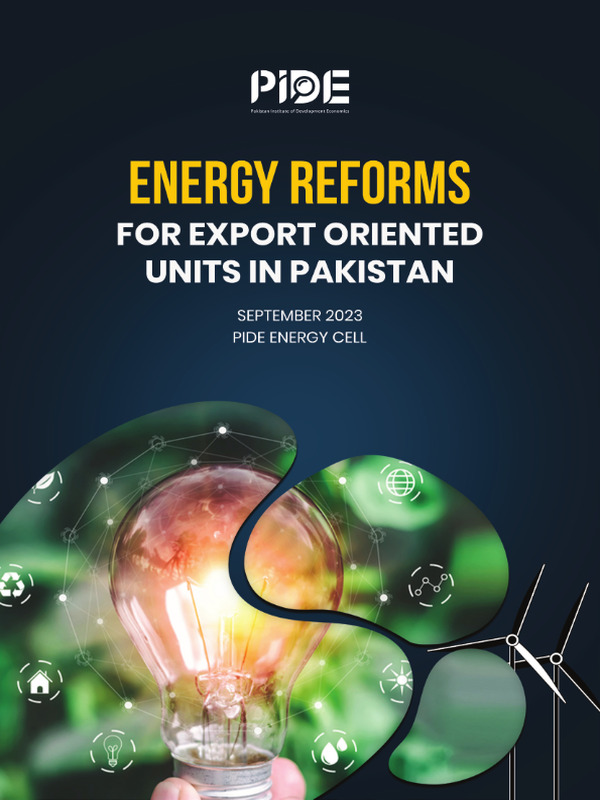Energy Reforms For Export Oriented Units In Pakistan
EXECUTIVE SUMMARY
Changes in energy prices are generally likely to have implications for the competitiveness of economies. Besides, a more profound concern is the disparity in the availability and price of energy might erode the productive efficiency in industrial units of some regions, eventually leading to deindustrialization.
The Circular Debt Management Plan 2023 aims to reduce the country’s growing circular debt by discontinuing the electricity tariff support for zero-rated industry, which led to no announcement of an industrial support package in Budget FY2024. The annual rebasing of nearly Rs 4.96/kWh for FY2024 and Rs 7.91/kWh for FY2023 under the IMF standby arrangement will increase the base tariff for different consumer categories, except for protected consumers, from Rs 3/KWh to Rs 7.50/KWh, leading to more than a doubling of the tariff for Bulk Power Consumer (B3 and B4).
This study explores the efficiency of tariffs and their effect on investment, employment, and revenue for various manufacturing sectors. The study also evaluates the potential impact of removing government electricity tariff support and maintaining varying gas prices on the textile and clothing industry.
First, the study examines data from 335 firms divided into two groups_ exporting and non-exporting. These groups were further subdivided into seven major manufacturing groups: textile, petroleum, chemical, food, cement, electronic and other manufacturing. The analysis finds that the rise in energy tariffs negatively impacts firms’ employment, investment, and sales revenue regardless of their export orientation. Although, this impact is more substantial for export-oriented firms in Punjab.
Second, the study projected the impact of gas/RLNG-based and NEPRA-determined energy tariffs (that is, greater than regionally competitive tariffs) on 47 export-oriented textile units. It finds that increasing energy costs would result in layoffs, decreased investment and export revenue, and significant profit margin contraction, leading to early deindustrialization in Punjab. However, the change in industrial electricity tariffs will not significantly affect textile EOUs in Sindh, as they already benefit from a competitive electricity tariff through local gas-based captive power plants.
To countercheck, the study also explores linkages between energy (electricity) tariff changes and external competitiveness of export-oriented units at the macro level and finds a robust negative association between export growth and energy tariff increase. A 1 percent increase in electricity tariffs decreases textile exports by 0.5 percent and other manufactured exports by 0.4 percent.
While analyzing the tariff, the study finds that the recent rise in electricity prices is a cross-subsidy from the industry to other sectors. This practice has no legal, economic, or technical justification.
The study suggests that the tariff mechanism in Pakistan needs to be reconsidered to lower electricity prices. The recommended approach is establishing a tariff system based on the service cost for all consumer categories, without cross-subsidies. The most effective method would be to adopt a flat linear tariff but vary it based on the service cost for each consumer category or geographical area.
Furthermore, allowing open access to all market participants on a non-discriminatory basis can reduce energy costs and improve supply for the industrial consumers in the country.
The gas price difference between EOUs in Punjab and Sindh is causing issues for Punjab’s industrial units. The limited availability of gas also affects the competitiveness of Punjab’s EOUs. After analyzing the tariffs, it was found that providing cheaper gas to Sindh is not economically efficient due to the depletion of indigenous gas resources.
It is necessary to reconsider the policies for pricing and allocating natural gas in Pakistan. The sector should be deregulated, and the pricing structure should be liberalized, allowing all consumers to compete for market share. A market-based pricing system would also reduce the gas price differential between industries in Punjab and Sindh. The power industry should be prioritized in getting a share of indigenous gas to reduce overall electricity generation costs.




